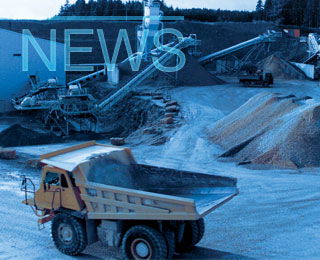Cementir's turnover improved by 2.2 per cent to EUR472.4m (US$627.6m) during first half of the year as improvements in the Far East, the Americas, Norway and Turkey more than compensated for lower volumes in Italy and Denmark.
The EBITDA improved by 10.8 per cent to EUR62m while the depreciation and impairment charge was 3.5 per cent ahead at EUR44.3m, leaving the trading profit 34.8 per cent ahead at EUR17.7m. The net financial charge was reduced by 71.1 per cent to EUR2.4m, resulting in a pre-tax profit of EUR15.3m, more than three times EUR4.8m achieved a year earlier and a loss the year before that. In spite of substantially higher tax and minorities charges, the net attributable profit jumped from EUR1.8m to EUR7.4m. The net debt at the end of June stood at EUR398.6m, 1.8 per cent lower than a year earlier, giving a gearing level of 39.9 per cent compared with 39.3 per cent a year earlier.
Grey and white cement shipments declined by 1.5 per cent to 4.6Mt, while the aggregates tonnage fell by 21 per cent to 1.41Mt, reflecting the weak demand in Italy and Denmark. Ready-mixed concrete deliveries, on the other hand, improved by 1.5 per cent to 1.79Mm³. The Italian construction market continued to weaken and cement deliveries fell by a further 15 per cent, but the loss at the EBITDA level was reduced from EUR6.1m to EUR4.6m. Denmark suffered from a hard winter and a weak construction market, but better prices and lower costs led to a two per cent improvement in the EBITDA to EUR26.2m. Ready-mixed concrete deliveries in Norway and Sweden improved, as did prices and margins, resulting in a 39 per cent increase in EBITDA to EUR9.4m.
Turkey experienced an eight per cent increase in turnover to EUR128.1m, though the EBITDA was 13.1 per cent lower at EUR13.1m, with volumes increasing by seven per cent in cement and by 12 per cent in ready-mixed concrete and exports of cementitious material being ahead. Egypt suffered from the political instability and although domestic deliveries improved, this was not enough to entirely offset the decline in exports though the EBITDA did improve by some six per cent. The Far Eastern operations in China and Malaysia increased turnover by 11 per cent at EUR31.6m and the EBITDA was ahead by 27 per cent to EUR7.7m, helped by higher volumes and lower fuel costs.
